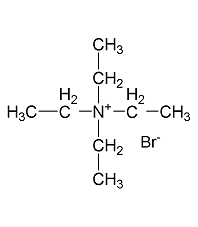
Structural formula
| Business number | 01GT |
|---|---|
| Molecular formula | C8H20BrN |
| Molecular weight | 210.16 |
| label |
TEA bromide, N,N,N-triethylacetolammonium bromide, Tetraethylammonium bromide, Tetraethylamine bromide, Ethyl bromide, Brothyl ammonium, Bromuredetetraethylammoniummuredetetraethylammonium, Etambro, (C2H5)4N(Br), catalyst |
Numbering system
CAS number:71-91-0
MDL number:MFCD00011825
EINECS number:200-769-4
RTECS number:BS5950000
BRN number:3563430
PubChem ID:None
Physical property data
1. Properties: white crystal, easy to absorb moisture. 2. Density (g/mL, 25/4℃): 1.397
3. Relative vapor density (g/mL, air=1): Uncertain
4. Melting point (ºC): 285 (dec.)(lit.)
5. Boiling point (ºC, normal pressure): Uncertain
6. Boiling point (ºC, 5.2 kPa): Uncertain
7. Refractive index: 1.442-1.444
8. Flash point (ºC): Uncertain
9. Specific rotation (º): Uncertain
10. Autoignition point or ignition temperature (ºC): Uncertain
11. Vapor pressure (kPa, 25 ºC): Uncertain
12. Saturated vapor pressure ( kPa, 60 ºC): Uncertain
13. Heat of combustion (KJ/mol): Uncertain
14. Critical temperature (ºC): Uncertain
15. Critical pressure (KPa): Uncertain
16. Log value of oil-water (octanol/water) partition coefficient: Uncertain
17. Explosion upper limit (%, V /V): Uncertain
18. Lower explosion limit (%, V/V): Uncertain
19. Solubility: Easily soluble in water, ethanol, chloroform and acetone, Slightly soluble in benzene.
Toxicological data
Acute toxicity: rat intraperitoneal LD50: 108 mg/kg; rat subcutaneous injection LD50: 200 mg/kg; rat intravenous LD50: 63 mg/kg; mouse oral LD50: >2 mg/kg;
Mouse abdominal LD50: 50 mg/kg; mouse intravenous LD50: 14200 ug/kg; dog intravenous LD50: 55 mg/kg; rabbit intravenous LD50: 72 mg/kg;
Ecological data
None
Molecular structure data
None
Compute chemical data
1. Reference value for hydrophobic parameter calculation (XlogP): None
2. Number of hydrogen bond donors: 0
3. Number of hydrogen bond acceptors: 1
4. Number of rotatable chemical bonds: 4
5. Number of tautomers: none
6. Topological molecule polar surface area 0
7. Number of heavy atoms: 10
8. Surface charge: 0
9. Complexity: 47.5
10. Number of isotope atoms: 0
11. Determine the number of atomic stereocenters: 0
12. Uncertain number of atomic stereocenters: 0
13. Determine the number of chemical bond stereocenters: 0
14. Number of uncertain chemical bond stereocenters: 0
15. Number of covalent bond units: 2
Properties and stability
Easily soluble in water and ethanol.
Storage method
This product should be stored in a sealed, cool, dry and dark place.
Synthesis method
In a 250mL three-necked flask equipped with a reflux condenser and a stirrer, add 7mL (5g, 0.05mol) triethylamine, 4mL (5.5g, 0.05mol) bromoethane and 20mL, 1,2-dichloroethane. Or benzene. Reflux and heat for 1.5 to 2 hours. After cooling the reaction solution, crystals are precipitated, filtered, washed twice with a small amount of 1,2-dichloroethane or benzene, dried and stored in a desiccator. Yield 8~10g.
Purpose
For ion pair chromatography. Tests gold, iridium, osmium, palladium, rhodium and ruthenium. Polarographic analysis. Used as a phase transfer catalyst in organic synthesis.

 微信扫一扫打赏
微信扫一扫打赏

